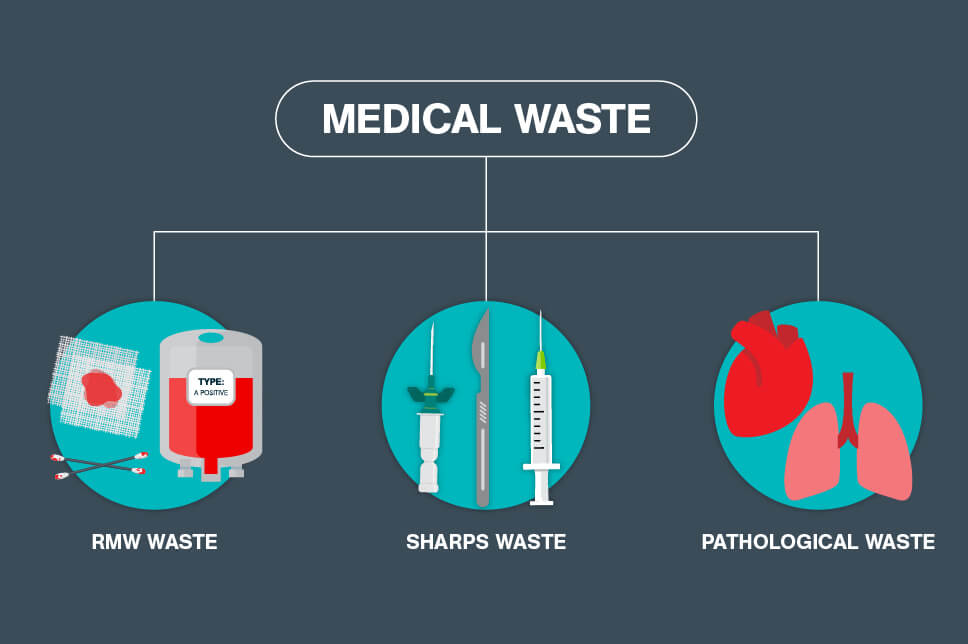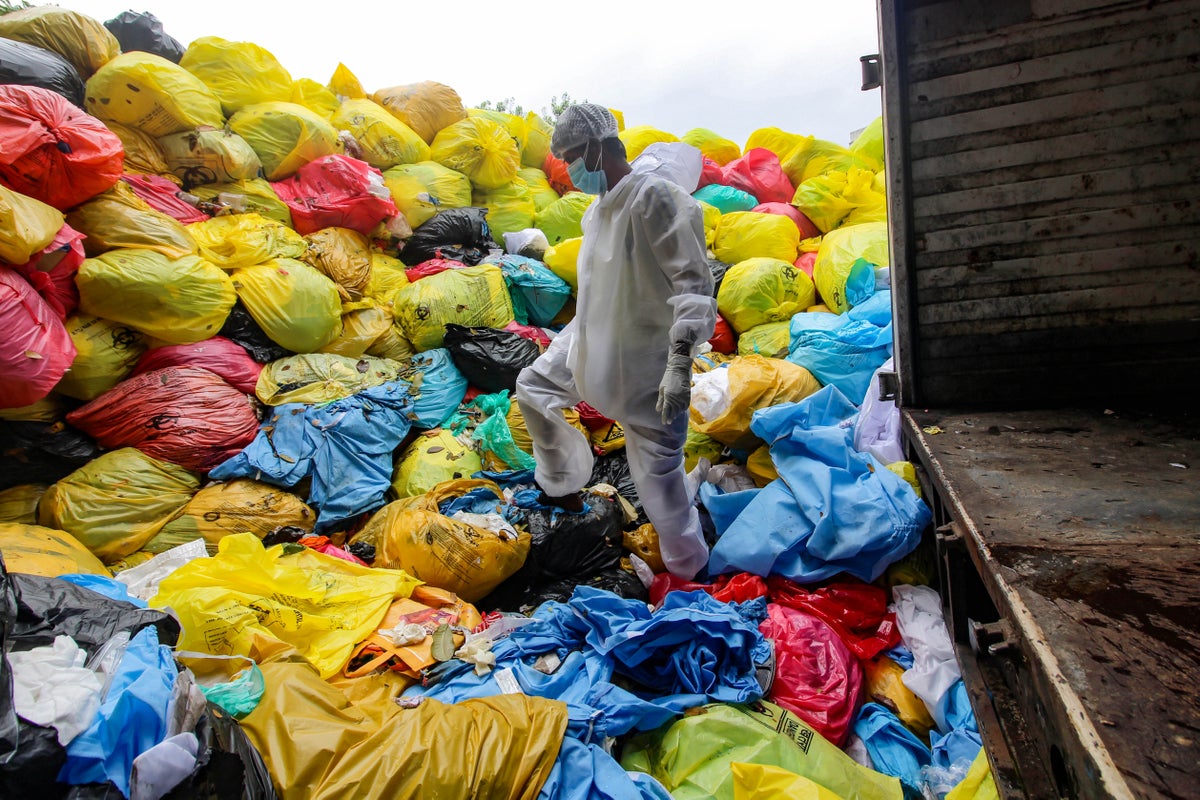Guaranteeing Safe Handling and Disposal of Medical Waste
Ensuring secure handling and disposal of clinical waste is of vital relevance in medical care setups. Inappropriate administration of medical waste can position considerable threats to the setting, public health and wellness, and health care workers. In this intro, we will certainly check out the significance of proper clinical waste monitoring, the threats connected with inappropriate handling and disposal, as well as the standards and methods that can be carried out to guarantee its risk-free disposal.
Importance of Correct Clinical Waste Management
Correct clinical waste management is of utmost value in guaranteeing the security and well-being of healthcare professionals, individuals, and the public. Clinical waste describes any type of waste generated by health care facilities during the diagnosis, therapy, or immunization of pets or humans. This waste can pose serious health and wellness risks otherwise managed and gotten rid of properly.
Among the primary reasons that correct medical waste administration is important is to avoid the spread of transmittable diseases. Clinical waste, such as made use of needles, contaminated dressings, and organic materials, can lug dangerous virus. If not managed and gotten rid of properly, these microorganisms can be sent to healthcare workers, people, waste handlers, and even the public, leading to the potential episode of diseases.
Furthermore, appropriate clinical waste management helps protect the atmosphere - medical waste removal. Medical waste consists of unsafe products, consisting of chemicals, drugs, and contaminated substances. When not managed properly, these substances can infect dirt, water bodies, and the air, posing a substantial danger to ecological communities and public wellness
Furthermore, effective medical waste management makes certain compliance with local regulations and international criteria. Governments and regulatory bodies have established methods and standards to make certain the safe handling, storage space, transport, and disposal of clinical waste. Abiding by these regulations is important to stay clear of legal consequences and maintain the online reputation and reliability of healthcare centers.
Dangers of Improper Handling and Disposal

If medical waste is not appropriately disposed of,Patients can also be exposed to these contagious diseases. If contaminated needles or other sharps are not disposed of in marked puncture-proof containers, they might mistakenly puncture people, leading to possible infections. Furthermore, if medical waste is not segregated correctly, there is a risk of cross-contamination between different kinds of waste, additional enhancing the possibilities of disease transmission.
Incorrect disposal of medical waste can also have detrimental effects on the setting and the public. If clinical waste is not treated and gotten rid of correctly, it can infect water resources, soil, and air, leading to the spread of diseases and contaminants. This can have long-term consequences on communities and public health.
Standards for Safe Handling of Medical Waste
Carrying out reliable methods for the secure handling of clinical waste is necessary in making sure the defense of medical care professionals, people, and the general public. These guidelines are vital in minimizing the threats connected with the handling and disposal of clinical waste, such as infections, injuries, and environmental air pollution.
Primarily, healthcare centers must develop a comprehensive waste monitoring plan that follows regional, nationwide, and international policies. This strategy must consist of clear instructions on waste segregation, packaging, transportation, storage, and labeling. It is crucial to separate different sorts of waste, such as sharps, infectious materials, pharmaceuticals, and non-hazardous waste, to avoid cross-contamination and promote risk-free disposal.
In addition, healthcare workers need to receive thorough training on proper waste handling methods. They need to be educated on the potential risks of clinical waste, the ideal usage of personal safety equipment (PPE), and the proper treatments for managing, moving, and throwing away different sorts of waste.
Moreover, medical care facilities should consistently keep an eye on and examine their waste monitoring practices to guarantee compliance with guidelines. This includes performing normal inspections, reviewing waste handling procedures, and providing responses and training to personnel.
Efficient Methods for Garbage Disposal
To make sure the secure handling and disposal of medical waste, it is vital to employ reliable approaches for garbage disposal. Clinical waste can posture substantial dangers to public health and wellness and the atmosphere if not taken care of and dealt with appropriately. Healthcare centers and waste administration organizations have to implement ideal methods to reduce these threats.
One reliable method for waste disposal is partition. It includes separating various types of medical waste based upon their attributes. Segregation enables the proper therapy and disposal of each waste category, minimizing the possibility for contamination or harm. Medical care facilities should supply clear guidelines and training to personnel on just how to segregate waste appropriately.

Additionally, health care facilities must team up with licensed waste management business to make sure correct disposal of medical waste. These business have the my company knowledge and devices called for to safely get rid of and take care of of clinical waste in conformity with guidelines and ideal techniques.
Training and Education And Learning for Healthcare Professionals
Healthcare professionals play an essential function in making certain the secure handling and disposal of clinical waste with extensive training and education and learning. It is essential for doctor to have a deep understanding of the prospective dangers connected with medical waste and the proper protocols for its administration. By getting correct training, medical care professionals can decrease the prospective transmission of infectious diseases, prevent ecological contamination, and shield both themselves and the general public.

Moreover, training programs should highlight making use of personal safety tools (PPE) and correct hand health techniques when managing clinical waste. medical waste disposal service. Health care professionals need to recognize exactly how to properly get rid of and use of PPE to secure themselves from possible exposure to dangerous products. They ought to additionally be enlightened on the significance of routine handwashing and the correct use hand sanitizers to reduce the spread of transmittable conditions
Continuing education and learning and normal updates on clinical waste management techniques are essential for health care experts. As policies and guidelines evolve, it is important to maintain medical care carriers informed regarding any type of changes in methods and finest practices. This will ensure that they remain updated and maintain a high requirement of security in disposing and managing of clinical waste.
Verdict
In verdict, proper handling and disposal of clinical waste is crucial to make sure the safety of health care specialists, people, and the environment. By adhering to these techniques, we can reduce the possible risks connected with medical waste.
Clinical waste refers to any type of waste generated by medical care centers during the medical diagnosis, treatment, or immunization of people or pets. If clinical waste is not set apart correctly, there is a risk of cross-contamination in between different types of waste, further enhancing the chances of disease transmission.
It is vital to separate different types of waste, such as sharps, transmittable materials, pharmaceuticals, and non-hazardous waste, to protect against cross-contamination and advertise risk-free disposal. WasteX Medical Waste Disposal.
To guarantee the safe handling and disposal of clinical waste, it is crucial to employ effective methods for waste disposal. Furthermore, medical care facilities ought to develop a regular waste collection and transportation timetable to protect against waste build-up and reduce the risk of crashes or contamination.